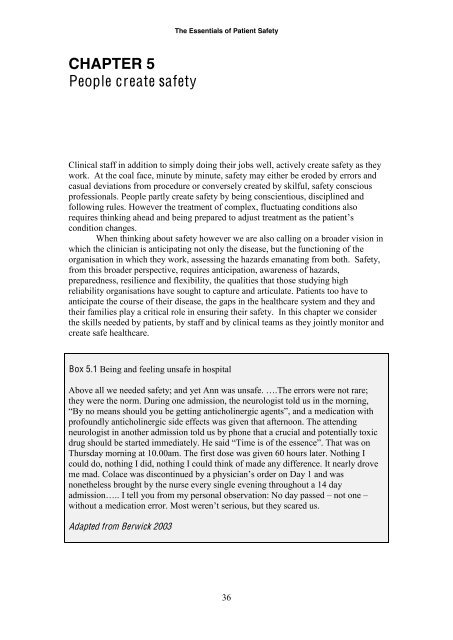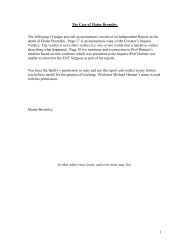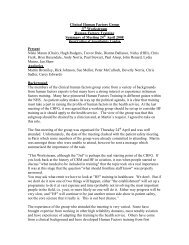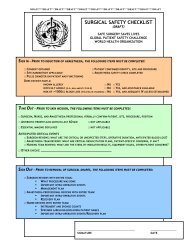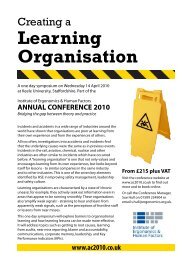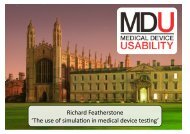The Essentials of Patient Safety - Clinical Human Factors Group
The Essentials of Patient Safety - Clinical Human Factors Group
The Essentials of Patient Safety - Clinical Human Factors Group
You also want an ePaper? Increase the reach of your titles
YUMPU automatically turns print PDFs into web optimized ePapers that Google loves.
<strong>The</strong> <strong>Essentials</strong> <strong>of</strong> <strong>Patient</strong> <strong>Safety</strong><br />
CHAPTER 5<br />
People create safety<br />
<strong>Clinical</strong> staff in addition to simply doing their jobs well, actively create safety as they<br />
work. At the coal face, minute by minute, safety may either be eroded by errors and<br />
casual deviations from procedure or conversely created by skilful, safety conscious<br />
pr<strong>of</strong>essionals. People partly create safety by being conscientious, disciplined and<br />
following rules. However the treatment <strong>of</strong> complex, fluctuating conditions also<br />
requires thinking ahead and being prepared to adjust tre<br />
condition changes.<br />
When thinking about safety however we are also calling on a broader vision in<br />
which the clinician is anticipating not only the disease, but the functioning <strong>of</strong> the<br />
organisation in which they work, assessing the hazards emanating from both. <strong>Safety</strong>,<br />
from this broader perspective, requires anticipation, awareness <strong>of</strong> hazards,<br />
preparedness, resilience and flexibility, the qualities that those studying high<br />
reliability organisations have sought to capture and articulate. <strong>Patient</strong>s too have to<br />
anticipate the course <strong>of</strong> their disease, the gaps in the healthcare system and they and<br />
their families play a critical role in ensuring their safety. In this chapter we consider<br />
the skills needed by patients, by staff and by clinical teams as they jointly monitor and<br />
create safe healthcare.<br />
Box 5.1 Being and feeling unsafe in hospital<br />
<br />
they were the norm. During one admission, the neurologist told us in the morning,<br />
<br />
pr<strong>of</strong>oundly anticholinergic side effects was given that afternoon. <strong>The</strong> attending<br />
neurologist in another admission told us by phone that a crucial and potentially toxic<br />
<br />
Thursday morning at 10.00am. <strong>The</strong> first dose was given 60 hours later. Nothing I<br />
could do, nothing I did, nothing I could think <strong>of</strong> made any difference. It nearly drove<br />
<br />
nonetheless brought by the nurse every single evening throughout a 14 day<br />
not one <br />
<br />
Adapted from Berwick 2003<br />
36


